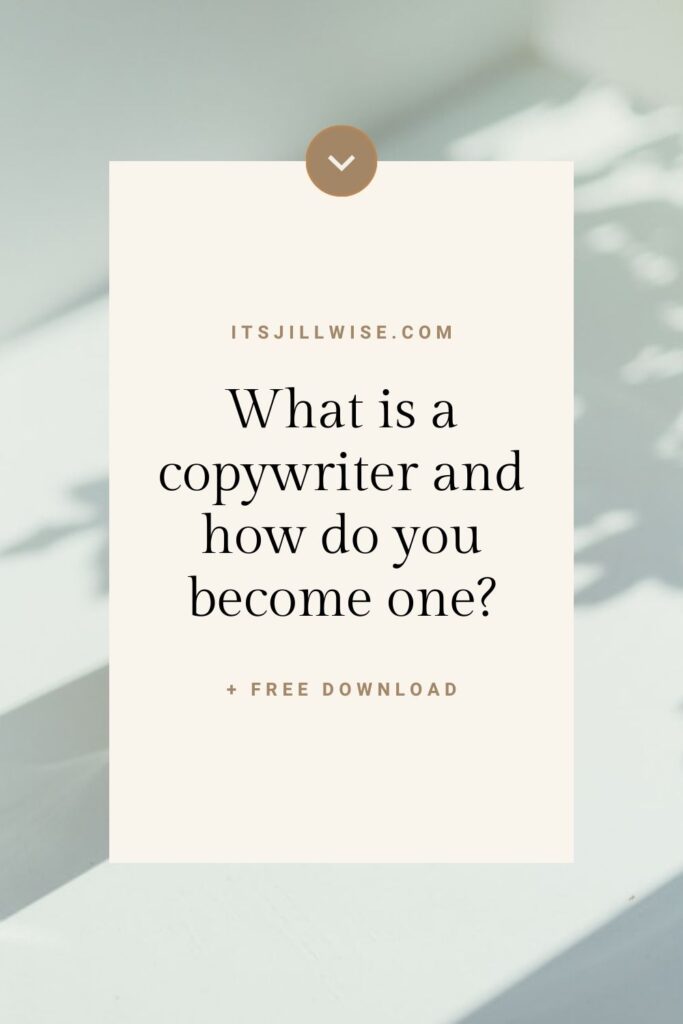What does a copywriter do, and how do you become one?
I asked this question myself a few years ago… After freelance writing for blogs, newspapers, and magazines for a years, I started to transition to writing for businesses. Instead of news stories and editorials, I started to write website copy, search engine optimized blog posts, social media content, and emails. I was doing the work of a copywriter without realizing it until a past editor and marketing agency owner who I freelanced for told me I was a copywriter. Huh? What is a copywriter?
That was a pivotal moment for my career.
I know I’m not the only one who’s asked this question before, and if you’re here, it’s safe to assume you’re wondering “what is a copywriter?” too. This blog post is going to explain it all and provide links to additional resources that will help you start and grow a freelance copywriting business if that’s the direction you choose to go.

How to become a copywriter
I shared a bit of my story already. The gist is that I had been freelancing for years, but mostly in the journalism and blogging worlds until an editor brought me on with his own business, a boutique marketing agency. After writing copy for a while, the agency owner and editor I freelanced for said to me: You know you’re a copywriter, right?
Wait—what? I had no idea what a copywriter was. So, naturally, I Googled it. It felt pretty neat to put a fancy name to this thing I’d been doing. This label was the true beginning of my career. The point at which I took things seriously. I remember going to my now husband and explaining to him that I was going to be like the female Don Draper writing copy (back when Mad Men was popular on TV).
Google told me that copywriters focus on making sales. Copywriters write for conversions. It’s not just creative, pretty writing, but a mix of psychology, sales, persuasion, creativity, storytelling, formulas, and unique positioning. It’s connecting with the reader in a really special way that encourages action. It was the perfect balance of all my previous work experience and university education, and I wanted to learn more.
Marketing school to become a copywriter
With my newfound title, I wanted to make this thing legit, so I looked up university programs that would teach me everything I needed to know for a real go at this. I settled on the University of Calgary, studying marketing and public relations with a heavy focus on writing for marketing. My courses included copywriting, copyediting, book publishing, content marketing, social media, etc. I learned so much in those few years, all while still freelancing. When I graduated, I was totally ready to go all in and made the full-time jump into my copywriting business.
Since then, I’ve continue to study. Both self-study and through formal learning environments. I’ve read the books, follow all the greats in our industry and reverse engineer their best work, experiment with new techniques, and enroll in online courses and programs. I’m obsessed with what I do, and think there’s always room to improve. I think that copywriting requires this kind of dedication though if you want to be one of the best in the field.
Anyone can become a copywriter and many can be a good copywriter. But a few stand out as the best.
My journey to become a copywriter
A lot as changed in my freelance business since shifting gears to focus entirely on copywriting and other marketing services. I expend on my journey to become a copywriter in this YouTube video if you’d like to learn more about my personal experience.
I made a lot of wrong turns along the way, taking on dud clients and low paying gigs. But eventually I learned how to position myself even in a potentially saturated industry of freelancers. I built a personal brand that clients trust, and have grown a sustainable and profitable freelance business over the years.
Which leads to the next questions… What does a copywriter do? What types of services do copywriters offer? And what does a freelance copywriter like me do all day?
What does a copywriter do?
I write conversion copy for private clients. My clients tend to identify as creative types, wellness experts, online business owners, and lifestyle brands. However, I also have worked with insurance agencies, bookkeepers, engineers, health care, mining, etc. These clients are typically located in Canada, the United States, and Australia—an even split between the three countries.
You may notice that the above description of my clients doesn’t relate to a specific niche. That’s because I choose to niche in an alternative way that’s more focused on my unique client experience and marketing style, which aligns with a specific type of personality. Even though my clients do different things in different industries, we share values and traits. That’s how we connect. This blog post explains more about how to choose a niche as a freelancer.
In general, copywriters work in marketing and advertising, writing copy that persuades readers to act in some way: Click the next button, sign up for the email list, join the program, or purchase a service, for example.
It needs to be noted that copywriting is different from content writing. As a freelance copywriter or content writer, you get to choose your specialty. I’ll walk you through a few of my areas of expertise as a freelance copywriter, as well as an overall look at what copywriters do.
Brand messaging development
My focus as a copywriter actually begins with brand messaging and brand strategy. Not all copywriters do this strategy deep dive for clients (or even want to), but I find it necessary to start here. Without a solid brand messaging strategy, it’s impossible to know what to say to increase conversions.
A brand messaging strategy includes core aspects of a brand like its mission, vision, and values. I also write elevator pitches and better identify the ideal target avatar a business wants to connect with. Through working together, I help clients identify their value propositions, nail down unique positioning points or differentiators, and incorporate all of the above with voice of customer research that myself or my team conducts.
From this strategy, I create a brand personality and voice for clients that feels authentic to them and resonates with their ideal clients. Brand personalities, style, and tone, are all part of my messaging work before writing any copy. Content categories, social media bios, brand best practices—these are all important components of a brand that a copywriter can be involved in, also filling the role of brand strategist.
Brand storytelling development
My work as a brand strategist and copywriter follows a typical flow from client to client. Next in the process, there’s the development of a brand’s story. This is part of their messaging work, but getting more into the details of what stories are on brand and what we should focus on in order to maximize conversions. A compelling story is necessary to facilitate connections with the brand, therefore drive conversions.
Myself and my team summarize all this foundational work into brand messaging guide, which is essentially a rule book or recipe for how a business acts as a whole. Consider this analogy: If I have a meal at a restaurant, I can probably tell you what ingredients are in the meal from taste. However, I can’t recreate that exact dish without a recipe. That’s why we need a brand messaging guide.
Website copywriting services
After completing a comprehensive brand messaging guide, the next typical flow for my clients is to audit and improve or write their website copy so it reflects the messaging. We look here next because websites are a crucial component of the overall sales pipeline for many businesses. The goal is to maximize the effectiveness of your website as a part of your inbound pipeline before moving onto other areas like content marketing, setting up funnels, planning live launches, and more.
Marketing and copywriting services
Once the pieces of their pipeline are ready to go (an inbound sales pipeline includes more than just the website copy, but that’s not the point of this post), my clients are often ready for marketing support and other copywriting services. This is where email marketing, email automations, content marketing, and more come into play.
Some copywriters choose to skip all the prior types of work and focus just on this part. As a freelance copywriter, you get to choose what type of work you want to do.
Digital product or course launch copywriting services
As my service-based clients grow their business from all the hard work they put into their marketing efforts, often they look to launching digital products or online courses next. So we get to work planning their live launch or designing their sales funnel.
This type of copywriting work includes lead magnet development, creating email sequences and writing sales copy for a strategic funnel that guides their audience through the buying journey.

What is a copywriter and what does a copywriter do?
To summarize, there’s a lot of different types of things a copywriter can do. If you’re looking to become a freelance copywriter, it’s up to you to choose your focus.
Potential deliverables a copywriter can write:
- Website copywriting
- Lead magnet and opt-in landing page copy
- Email sequences: nurture sequence and/or sales sequence
- Email automations to run an online shop
- Sales funnel copy
- Search engine optimized blog posts
- Content marketing calendars
- Social media content
- Sales page launch copy
- Email marketing copy
- Paid ad traffic copy
The above isn’t an exhaustive list! A copywriter can write anything that is designed to inspire an action (or a conversion) of any kind.
How much does a copywriter make?
Like any career, there’s a huge range in the earning potential for copywriters. Average copywriters will make an average salary, probably around $50k per year in Canada, according to salary tracking websites like this one. However, skilled copywriters can make a lot more than that. My income exceeds 6-figures from my freelance copywriting work alone. I also coach other freelance copywriters to build 6-figure copywriting businesses inside The Inner Circle Mastermind.
The key to earning more as a copywriter is twofold: Become a damn good copywriter that delivers actual results. Then sell those results well to higher paying clients.
Also, value-based pricing is always the way to go. Why? Here’s an example for you. If a copywriter writes a sales page and launch emails that bring in $500k in sales from a single launch, I sure hope that copywriter is paid more than $50k annually because the value they bring in is worth more. This blog post shares more about how to charge for freelance work.

How to become a copywriter
If you’re still reading, I hope that means you’re convinced you want to become a freelance copywriter. Amazing! There’s a lot of overwhelming advice on the internet about how to become a copywriter. Let’s skip all that, and get into the real, no BS way to become a freelance copywriter.
This blog post shares 5 tips to become a copywriter. But keep reading below for a few more easy how-to’s. Even if you have no experience, you can start a freelance copywriting business and grow as you work.
How to find copywriting clients
The first step is to get copywriting clients. My best advice for brand new freelancers is to do 3 things:
- Leverage your current network to get copywriting clients.
- Cold pitch brands you’d love to work with.
- Set up your inbound sales pipeline at the same time, so eventually copywriting clients can find you.
This blog post goes into more detail about how to find copywriting clients as a newbie.
Marketing your copywriting business
Marketing for freelancers: How do you attract dream clients as a freelance copywriter? Building and refining an inbound sales pipeline as a freelancer is an overlooked strategy to find copywriting clients. So many freelance copywriters skip any kind of marketing efforts. They don’t like it, or don’t find it easy, so they just don’t do it.
The good news for you is that if you dedicate yourself to marketing your copywriting business, you will stand out from the crowd. My advice is to always work on building your inbound pipeline alongside other tactics to find copywriting clients as a newbie.
- Build your inbound sales pipeline.
- Focus on driving traffic through content marketing to the top of the funnel.
- Track your numbers and refine as you go.
This blog post breaks down my top recommendations around marketing for freelancers if you want to learn more.

What is a copywriter, and why does my business need one?
Of course, we’ve come to the question of: What is a copywriter, and why hire a copywriter? Maybe you’re not looking to become a copywriter, but you’re a business owner who needs copy written for your business.
You could DIY your copy for a while, but eventually you’ll run out of capacity to do everything. It’s tough to balance all the things as a business owner, solopreneur, or freelancer. How do you know what you choose to outsource is the best next step for you? Here’s when and why you should hire a copywriter…
When to hire a copywriter?
I typically suggest that businesses hire a copywriter after they’ve made a few sales. Prove your product or service first, then bring in the experts to help you make even more sales and really grow your business. This is because when we’re new to business, our products and services are likely to shift drastically over time as we learn what works and doesn’t work for ourselves and clients. I would hate to write website copy for a client that needs to change in 6 months because they pivoted from the original plan.
Instead, I recommend learning the basics of copywriting in the early days, taking courses to improve, and once you have consistent sales coming in, outsource your copy to someone who can help you level up.
Of course, if you really don’t think you can do it alone and just need some help, it’s okay to hire a copywriter when you’re new to business. Just know that your direction might shift and that’s okay!
Why hire a copywriter?
If you want to generate more revenue by making more sales, hire a copywriter. If you want to nail down your messaging and really stand out from the competition, hire a copywriter. If you want to launch a new offer in a way that’s compelling, strategic, and attracts dream clients, hire a copywriter.
A copywriter can help you do the following:
- Attract the right clients and customers, and repel the rest.
- Grow your blog traffic and email list, then nurture those subscribers.
- Design and implement a sales funnel for your business.
- Increase website conversions, so you make more sales.
- Help you launch a new offer to an existing audience and get sales.
It’s best to hire a copywriter to write custom copy when your business is proven and more established. When you’re brand new, DIYing may make more sense until your offers are validated. The reason is that things often change when your business or offer is new. It will be more impactful to hire a copywriter when you know what you do and who you help.
A copywriter can help you refine your messaging and better position your offer in the market. However, you need to know what you’re selling, to who, and why first.
How do you hire a copywriter?
If you’re ready to hire a copywriter, start by finding someone who you respect. Who really seems to know what they’re talking about? Which copywriters give off a vibe that you want to work with? Even in business, I look for personalities that click, along with the skills and results to match.
And of course, consider your copywriter’s areas of expertise. Not all copywriters write all copy. It’s up to you to ask the necessary questions to determine if this person is a good fit for your current needs.
Next, if you’re hoping to contract an independent copywriter, think of them as an expert you can trust to guide you through the process, rather than an employee that needs to be managed. As a business owner, I take the stress off my clients’ shoulders. They come to me because they know that the experience will be easy, clear, and that I can keep a project on track to launch on time. I confidently offer recommendations, give direction for the overall project, create the outlined deliverables by deadlines, and consult as needed for the business’ marketing strategy as a whole—all with little heavy lifting needed from clients aside from gathering information and giving feedback.
If you’d rather take control of the entire process, it’s probably a better idea to hire a full-time in house copywriter to help you… Or learn how to DIY well.
My client discovery process
Now if you go the route of finding a freelance copywriter, it’s likely that they have a process to help both of you determine if it’s a good fit. For example, leads find my website and complete my contact form. From there, my client management software automatically sends information to these leads, including a bit about my process, past experience, and starting points for popular packages. This information helps the lead decide if they want to move to the next stage, which is a discovery call.
While on the call, we both have the chance to ask each other questions and get to know each other. If I think we’re a good fit, I’ll offer to send a proposal.
The proposal outlines all project details, like the scope, timeline, and investment. I send this along with a contract. When they accept the proposal and sign the contract, my system also populates their deposit due on the attached invoice. They are added to my calendar after the deposit is received.
How to start freelancing with 4 Steps to Profit
We have covered a lot of ground here! I hope you find this information helpful. If you want to start your own copywriting business… or any freelance business… My free guide, 4 Steps to Profit, will teach you the foundations you need to get started. These pillar insights, proprietary exercises, and business tools will help you build and grow as a freelancer who stands out from the crowd. Learn more and get 4 Steps to Profit here.
Recreate your work life reality
Regardless of whether you’re a freelancer trying to reclaim your life, or a business owner who’s found yourself chronically overworked… You’ll likely discover that you need to recreate your work-life reality at some point throughout your entrepreneurial career. You can do exactly that with my course, Align + Integrate.
Related
Leave a Reply Cancel reply
Leave your info below to join the list. I send a lot of emails because people love to read them.
